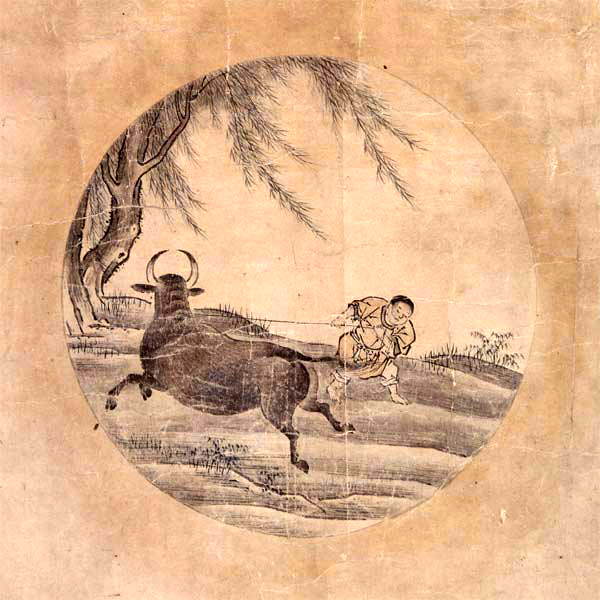Jenny Hall
Verses from the Dhammapada 26
Jenny Hall takes a look at Right Mindfulness in our day to day life, the key to Buddhist practice.

Picture no.4 from the Ten Bull poem
“Ignorant and foolish people become lazy. The wise man regards watchfulness as his greatest treasure.”
This verse points to Right Mindfulness, a step on the Buddha’s Noble Eightfold Path. Right Mindfulness is being fully with what is occurring in each moment.
Most of the time, however, we are distracted. Multitasking seems to be a common feature of our lives. We often eat our breakfast against the background of the radio or television. We constantly check the messages on our phones, perhaps at the same time giving cursory replies to our partner also engaged in such activities. The cereal and toast are barely noticed let alone tasted and relished.
‘Ignorant and foolish people… ‘
The Buddha taught that the ‘me’ only half-heartedly involved in our daily routines is actually a delusion. It is made up of constant streams of thought powered by the emotions.
Recently, our local museum exhibited collages assembled by local primary school pupils. In the centre of each was a photograph of a child. Surrounding this was a diverse collection of drawings and paintings depicting objects and activities. All bore the title This is me. In a similar way, we cling to our thought streams in an attempt to compile permanent pictures of ‘me’ and ‘others’.
These pictures obscure reality which is constantly changing.
Like many communities, in 2022 our Close arranged a Jubilee party. Many of us knew each other well, others had never met. It was interesting to discover how many misconceptions I had been harbouring. For example, making an effort to introduce two very elderly neighbours whom I had judged as ‘lonely’, it was discovered both had active social lives. One, despite using a mobility scooter, helped run a group of cubs. The other enjoyed tap-dancing classes.
In such ways we allow pre-judgement to influence actions. It is no surprise that these actions often ‘miss the mark’.
The release of thoughts making up ’me’ is known as Right Mindfulness. A helpful translation is ‘choiceless awareness’. The Zen training offers us the key to such liberation. We are shown how, wholeheartedly, to give ourselves into both emotions and situations as they arise. In the Zen tradition, the hot emotional energy is known as the Bull. Giving ourselves involves meeting and suffering its burning and churning. We reverently ask it to ‘burn me away’. With ‘me’ out of the way, the clear-sighted wisdom of choiceless awareness is revealed. This can always be trusted to respond appropriately for the good of all.
‘… become lazy..’
Even if we have been in the training for many years, the Bull may still elude us. It is very wily. When my husband fell and fractured three ribs, I ignored the anxiety that arose. Knowing that my husband needed to rest completely, I decided to add extra Zazen periods into the daily timetable. However, my husband’s convalescence created more chores than I’d bargained for. I found myself rushing from one task to another. The extra Zazen was abandoned. After a while, even the regular sitting meditation was missed. I was so over-tired that I couldn’t sleep at night. It wasn’t long before I suddenly heard a petulant voice, (mine!), complaining that everything was getting on top of me. It was realised that the Bull had been stomping around for quite a few days. I had been trying to impose ‘my’ plan on the situation. The underlying anxiety was met. There was a wholehearted giving into tending to my husband’s needs. The daily Zazen period was resumed. Fatigue and sleeplessness disappeared. All flowed effortlessly.
‘The wise man regards watchfulness as his greatest treasure.’
A king was searching for the secret of happiness. One of his ministers told him that a holy man was living in a mountain cave. He shone with serenity and joy. The king ordered his minster to discover the holy man’s secret. The minister soon returned. He told the king he had secretly observed the saint but he was just following a daily routine. The king was angry and accused the minister of falling to pay attention. He decided to visit the holy man himself. When he arrived at the cave, like the minister, he concealed himself, in order to watch him. He soon realised that the minister was telling the truth. There was nothing unusual in the saint’s actions. The king decided to ask for his guidance. The saint greeted him respectfully and offered him a cup of tea. The king was deeply impressed by the peace and joy radiating from him. He said “Please forgive my question, but please tell me the secret of your contentment. I have watched you but you seem to lead a very ordinary life.”
The saint smiled with great compassion. He said “You must look closely. When I drink tea, I drink tea. When I chop wood, I chop wood”. The king looked puzzled. The holy man continued, “When you drink, you are thinking of your past. When you eat, you are thinking of the future.” As the king reflected on these words, he wondered how to incorporate them into his life. He looked at the saint. He was just drinking his tea, smiling.
Thich Nhat Hanh said:
“Mindfulness is the miracle that can call back in a flash our dispersed mind and restore it to wholeness”.
The joy and peace of this wholeness is our ‘greatest treasure’.
































































